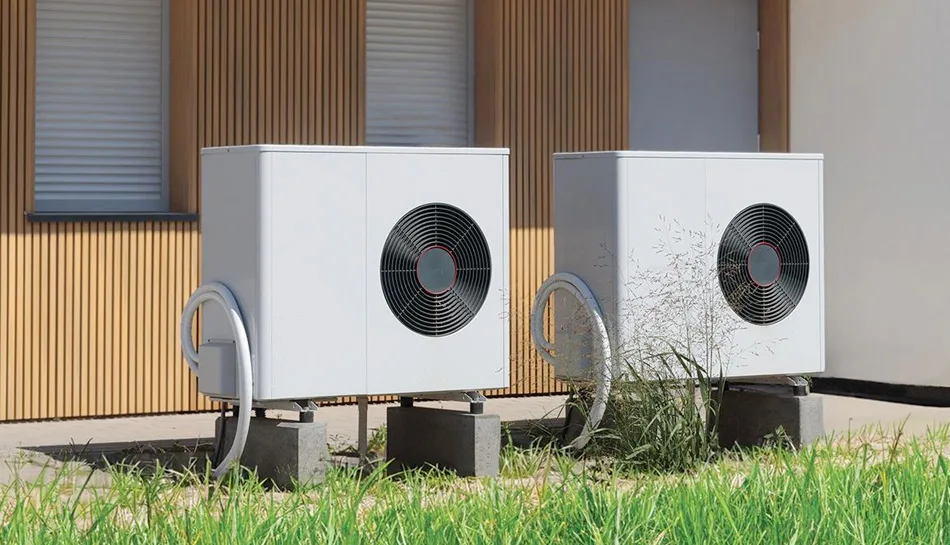Air-to-water heat pumps are an innovative technology rapidly gaining popularity among choices for heating and hot water supply in residential and commercial buildings. They use the heat in the outside air to work, which reduces consumption and lowers carbon emissions, thus helping a lot in the protection of the environment.
How does an air-to-water heat pump work? What are its unique advantages compared to other heat pumps? What are the advantages of using air-to-water heat pumps? Let’s look at that in detail.
The principle of an air-to-water heat pump is based on the process of transferring heat from the outside air by using a refrigerant to the water, then heating either the building or providing hot water.
To put it another way, the refrigerant absorbs the heat from the air, turns it into a gas, and then compresses it using a compressor to raise its temperature. A heat exchanger, which is used in water heaters and indoor heating systems, then helps transfer the heat to the water. Due to their ability to extract heat from cold air, air-to-water heat pumps can function efficiently even in the midst of a frigid winter.
Water-to-water heat pumps and ground source heat pumps are the other two common types of heat pumps. Water-to-water heat pumps extract heat from groundwater or surface water. It is more efficient but needs to depend on water sources, and installation costs will be relatively high.
Through the buried pipeline system, ground-source heat pumps can extract energy from geothermal sources, offering consistent energy efficiency performance appropriate for long-term use. However, the construction of the installation was difficult and costly. Conversely, an air-to-water heat pump is comparatively simple to install, has a broad range of applications, requires a relatively small initial investment, and can be used in a variety of climates.

The use of air-to-water heat pumps comes with several benefits. Here, we introduce the four major advantages of air-to-water heat pumps.
Energy Efficiency
One of the major advantages of air-to-water heat pumps is that they are very energy-efficient. These systems usually have a high coefficient of performance, meaning that with very little electricity, they are able to produce lots of heat.
In this process, energy consumption is very low and can not only cut down greatly on electricity consumption but also bring continuous energy saving to the users, especially in those areas where heating demand is higher in winter seasons. With the advance of technology, energy efficiency for air-to-water heat pumps kept improving, thus making them more competitive in the global market.
Reduce Carbon Footprint
The air-to-water heat pump also has the great benefit of reducing carbon emissions. An air-to-water heat pump doesn’t require any kind of fossil fuel to generate heat because it gets its heat from the surrounding air. Compared to other traditional systems, such as gas and oil boiler systems, air-to-water heat pumps emit significantly less carbon dioxide while in operation.
Because they are a more environmentally friendly option, this is also the reason why air-to-water heat pumps have become more and more popular. In addition, air is a renewable resource that can never run out, which makes air-to-water heat pumps even more environmentally friendly and sustainable.
Cost Savings
While the initial installation cost of an air-to-water heat pump may be a bit higher than that of some conventional heating and cooling systems, this system would be noticeably more economic in the long run. It can save tremendous money with more efficient use of energy and low-cost operation. Savings from this would not only pay off the initial investment but also provide considerable cost benefits to users throughout the life of the system.
Versatility
Air-to-water heat pumps have many features, and no matter the weather, they can be utilized. Not only during winter, when they provide effective heating, but they can also reverse cooling during summer. The two-way operation makes them a versatile system that users can adapt throughout the year in different seasons for their various needs.
Whether providing stable room temperature for a residential building or flexible environmental control for a commercial building, air-to-water heat pumps offer versatility and high efficiency.
Due to the many advantages they offer, air-to-water heat pumps are growing in popularity. The versatility and high efficiency of air-to-water heat pumps make them ideal for a variety of applications, from providing consistent room temperatures in residential buildings to providing flexible environmental control in commercial buildings.